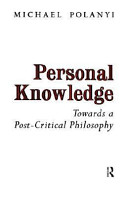The Importance of Peer Review
Nobody knows more than a tiny fragment of science well enough to judge its validity and value at first hand. For the rest he has to rely on views accepted at second hand on the authority of a community of people accredited as scientists. But this accrediting depends in its turn on a complex organization. For each member of the community can judge at first hand only a small number of his fellow members, and yet eventually each is accredited by all. What happens is that each recognizes as scientists a number of others by whom he is recognized as such in return, and these relations form chains which transmit these mutual recognitions at second hand through the whole community. This is how each member becomes directly or indirectly accredited by all. The system extends into the past. Its members recognize the same set of persons as their masters and derive from this allegiance a common tradition, of which each carries on a particular strand.
Notes:
Each of us can only understand a small portion of science, thus we need a collaboration of mind to determine truth.
Folksonomies: science peer review
Taxonomies:
/technology and computing/programming languages/javascript (0.423432)
/business and industrial/advertising and marketing/telemarketing (0.292521)
/science (0.283377)
Keywords:
relations form chains (0.901003 (positive:0.264317)), tiny fragment (0.728011 (positive:0.655963)), Peer Review (0.726975 (neutral:0.000000)), small portion (0.711414 (neutral:0.000000)), mutual recognitions (0.685043 (positive:0.264317)), complex organization (0.658561 (neutral:0.000000)), particular strand (0.651163 (positive:0.354636)), fellow members (0.640231 (neutral:0.000000)), common tradition (0.624521 (positive:0.296174)), small number (0.601362 (neutral:0.000000)), hand (0.512002 (positive:0.402398)), community (0.420635 (positive:0.275615)), science (0.374681 (positive:0.655963)), scientists (0.358528 (positive:0.286914)), accrediting (0.330095 (neutral:0.000000)), validity (0.320758 (positive:0.655963)), allegiance (0.314760 (positive:0.296174)), Importance (0.300404 (neutral:0.000000)), collaboration (0.299016 (neutral:0.000000)), rest (0.298480 (positive:0.286914)), truth (0.295741 (neutral:0.000000)), turn (0.294199 (neutral:0.000000)), mind (0.290460 (neutral:0.000000)), authority (0.288631 (positive:0.286914)), value (0.284079 (positive:0.655963)), return (0.283922 (neutral:0.000000)), views (0.282582 (positive:0.286914)), people (0.282072 (positive:0.286914)), past (0.278753 (neutral:0.000000))
Concepts:
Member of Parliament (0.931118): dbpedia | freebase | opencyc | yago
Scientific method (0.838255): dbpedia | freebase
Mathematics (0.777200): dbpedia | freebase | opencyc
Mark Millar (0.770911): website | dbpedia | freebase | yago
Epistemology (0.716054): dbpedia | freebase | opencyc
Peer review (0.659057): dbpedia | freebase
Complex number (0.633992): dbpedia | freebase | opencyc
Knowledge (0.626232): dbpedia | freebase





